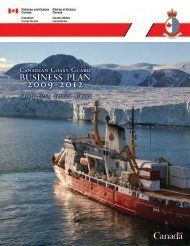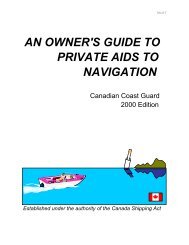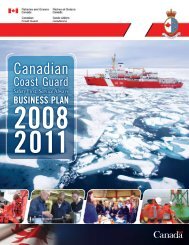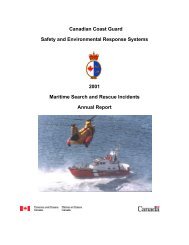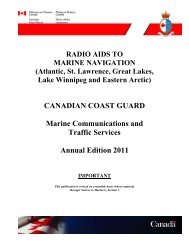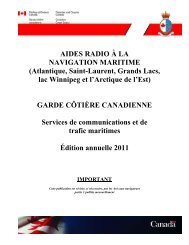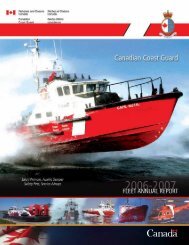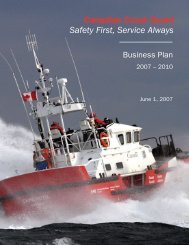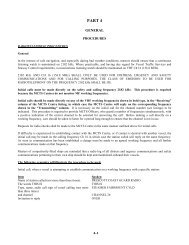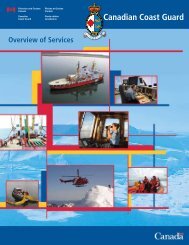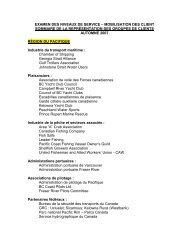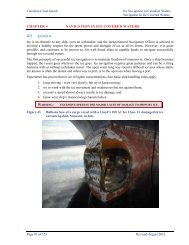RADIO AIDS TO MARINE NAVIGATION - Canadian Coast Guard
RADIO AIDS TO MARINE NAVIGATION - Canadian Coast Guard
RADIO AIDS TO MARINE NAVIGATION - Canadian Coast Guard
You also want an ePaper? Increase the reach of your titles
YUMPU automatically turns print PDFs into web optimized ePapers that Google loves.
5) Automatic Identification System (AIS) – Installation of AIS equipment at MCTS Centres in Western Canada<br />
In 2009, the <strong>Canadian</strong> <strong>Coast</strong> <strong>Guard</strong> will be commencing the installation of its AIS system on the Pacific <strong>Coast</strong>. Installation<br />
should be completed by the end of March, 2010.<br />
AIS equipment will be installed at the following MCTS Centres:<br />
Comox<br />
Prince Rupert<br />
Tofino<br />
Vancouver<br />
Victoria<br />
During the installation period, MCTS Centres will be able to receive dynamic information (position, heading and speed),<br />
static information (vessel description) and voyage information as transmitted by the vessel’s AIS. The CCG AIS system<br />
will be on ‘Initial Operational Condition’ (IOC) until further advice. ‘Full Operational Condition’ (FOC) of the system<br />
will be promulgated by means of a Notice to Shipping and a Notice to Mariners.<br />
Safety and binary messages services will not be provided until a decision has been made.<br />
6) Discontinuation of 121.5/243 MHz Distress Beacon Monitoring by the COSPAS-SARSAT Satellite Constellation<br />
COSPAS-SARSAT is the international organization that operates a series of satellites in low altitude and geostationary<br />
orbits for search and rescue. In response to recommendations from the International Maritime Organization (IMO) and the<br />
International Civil Aviation Organization (ICAO), the Council of COSPAS-SARSAT announced at its October 2000<br />
meeting in Laval, Quebec that it will be phasing out satellite processing of distress beacons operating in the<br />
121.5/243 MHz range and encouraging users to adopt 406 MHz beacons by 2009 at the latest, as this is when the switchover<br />
will be completed.<br />
Three types of distress beacons are in use: Emergency Locator Transmitters (ELTs), used on aircraft; Emergency<br />
Positioning Indicator Radio Beacons (EPIRBs), used on vessels; and Personal Locator Beacons (PLBs), used by land-based<br />
personnel.<br />
The impact of this change should be negligible aboard <strong>Canadian</strong> vessels as there are no 121.5 MHz marine EPIRBs that<br />
have a valid technical acceptance certificate (TAC) under the Radiocommunication Act. Therefore, it is illegal for anyone<br />
to sell or fit such an EPIRB in Canada or aboard a <strong>Canadian</strong> vessel. Only those COSPAS-SARSAT EPIRBs transmitting<br />
on 406 MHz are approved for use in Canada and these units will not be impacted by this change in satellite detection.<br />
The use of 406 MHz distress beacons over the 121.5/243 MHz distress beacons will minimize the problems with false<br />
alerts being received by rescue coordination centres. Since its inception in 1982 the COSPAS-SARSAT System has<br />
provided distress alert information which has assisted in the rescue of over 18,865 persons in 5,317 distress situations.<br />
Mariners are encouraged to fit float-free EPIRBs and register their COSPAS-SARSAT 406 MHz EPIRBs free-of-charge<br />
with the <strong>Canadian</strong> Beacon Database by telephone 1-800-727-9414; by facsimile 613-996-3746; or, on the Website at<br />
http://www.nss.gc.ca/site/cospas-sarsat/emergencyBeacon_e.asp<br />
IMPORTANT !<br />
DON’T FORGET <strong>TO</strong> REGISTER YOUR EPIRB<br />
IT COULD SAVE YOUR LIFE<br />
Discontinuation of INMARSAT 'E' EPIRB monitoring service as of December 1, 2006<br />
INMARSAT has discontinued their monitoring service of INMARSAT 'E' EPIRB distress alerts as of December 1, 2006.<br />
Mariners should check with INMARSAT for exchange of any currently held INMARSAT 'E' EPIRBs. Further, mariners<br />
should only purchase and fit COSPAS-SARSAT 406 MHz EPIRBs from now on.<br />
1-2



